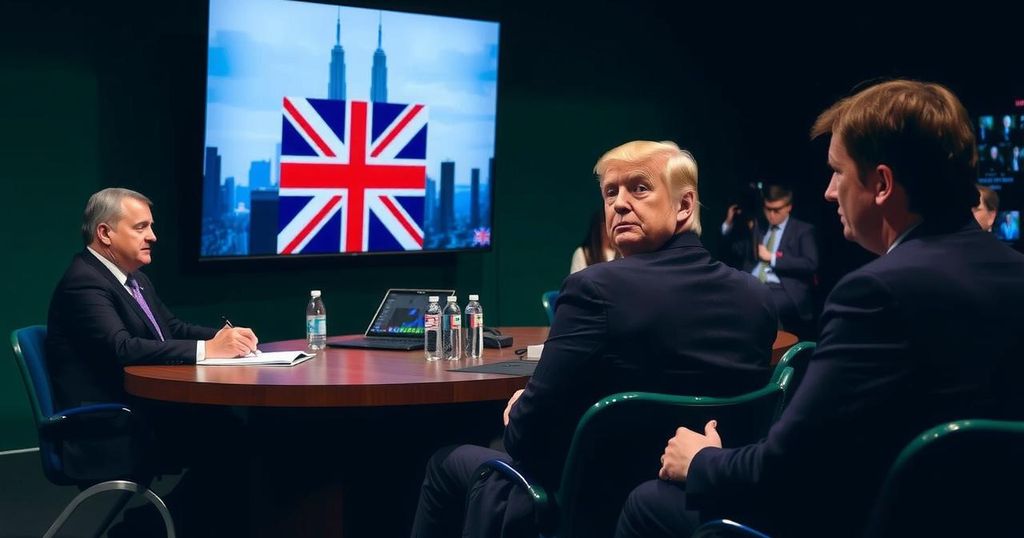UK to Lead Climate Initiatives at COP29 Despite Challenges from Trump Re-election
UK Energy Secretary Ed Miliband asserts the importance of ramping up renewable energy efforts for national security, particularly in light of Donald Trump’s re-election jeopardizing climate progress. He vows that the UK will lead COP29 negotiations to secure vital international agreements, amidst a backdrop of significant global leadership absences and challenges in funding for poorer countries facing severe climate impacts.
In light of the recent re-election of Donald Trump, UK Energy Secretary Ed Miliband has emphasized the urgency for the UK to enhance its efforts in renewable energy, positioning it as central to national security amidst mounting global challenges. He indicated that at the upcoming COP29 summit in Baku, the UK aims to spearhead initiatives aimed at securing a pivotal global climate agreement. The re-election of Mr. Trump, who has consistently undermined climate science, poses a significant risk to progress made under the previous U.S. administration led by Joe Biden, known for prioritizing climate issues. Miliband asserted, “The only way to keep the British people secure today is by making Britain a clean-energy superpower… This government is committed to accelerating climate action precisely because it is by doing this that we protect our country, with energy security, lower bills, and good jobs.” He expressed a commitment to providing a strong example to other nations, emphasizing that combating climate breakdown is a universal responsibility that transcends borders. The COP29 summit faces potential turbulence as key leaders from the EU, Germany, and France have opted not to attend due to domestic crises, further complicating efforts to unify around a comprehensive climate strategy. Miliband intends to lead the UK delegation, prioritizing the need for a significant climate finance commitment to assist poorer nations grappling with severe consequences of climate change. He underscored Britain’s role in filling the leadership vacuum left by the U.S. Former Chair of the UK’s Committee on Climate Change, Adair Turner, remarked on the pervasive shadow cast by Trump’s presidency, suggesting that previous advancements in U.S. climate policy are now endangered. He cautioned about the global implications of reduced U.S. engagement in climate dialogue, which could hinder efforts to secure necessary funding for climate initiatives, especially for developing nations that are vulnerable to climate-related disasters. As discussions at COP29 unfurl, there is an urgent call for innovative solutions to meet the financial demands laid out by poorer countries, which seek at least $1 trillion per year by 2035 to mitigate greenhouse gas emissions. The viability of funding models, such as taxing fossil fuels or billionaires, are under scrutiny, yet face opposition from significant economic players. Ultimately, the UK government is challenged to assert leadership and foster cooperation, ensuring that the ambitions set forth at COP29 reflect the scale of the climate crisis.
The article addresses the pressing concern of climate change governance in light of the geopolitics influenced by the re-election of Donald Trump, who has a known record of dismissing climate science. With the COP29 summit approaching, Ed Miliband’s remarks highlight the UK’s intention to assume a leadership role in global climate discussions, particularly in providing financial support to less developed countries. Amidst the challenges posed by absences of key leaders at the summit and diminishing U.S. commitment under Trump, the urgency for coordinated climate action remains paramount.
In summary, the re-election of Donald Trump introduces significant uncertainties for global climate action, contrasting sharply with the UK’s ambition to take on a leadership role at COP29. Ed Miliband’s call for enhanced renewable energy efforts and increased climate finance underscores the critical need for unified international cooperation to advance global climate goals. The outcome of the upcoming summit will significantly influence the future landscape of climate policy and funding, particularly for developing nations reliant on substantial financial support to tackle climate challenges.
Original Source: www.theguardian.com




Post Comment